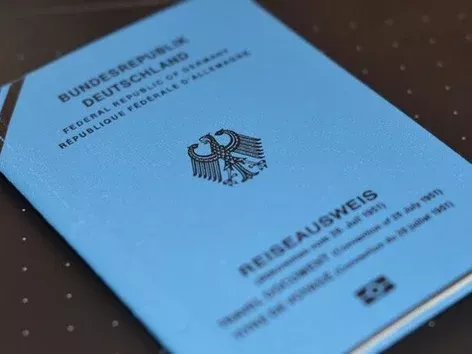Paragraph 25: obtaining permanent residence for refugees in Germany 2024

In order to stay in Germany, refugees can apply for asylum. To do so, they must go through the appropriate procedure and receive an official notification from the Aufenthaltsgestattung. Find out more about who is eligible for permanent residence for refugees in Germany under Paragraph 25 in 2024
Germany is one of the leaders in Europe in terms of the number of refugees. From January to November 2023, 325,801 asylum applications were filed in Germany, of which 304,581 were initial applications. This does not include refugees from Ukraine, who have been regularly arriving in the country since the end of February 2022.
The majority of asylum seekers came from Syria (97,183 initial applications), Afghanistan (50,327), Turkey (56,573) and Iraq (11,488). About 47% of all first-time asylum seekers in Germany were women, as well as children and young people under the age of 18.
Asylum seekers in Germany are entitled to social protection and a residence permit. How to obtain a residence permit for refugees in Germany? Detailed instructions are below.
Who is eligible for a refugee residence permit in Germany?
Foreigners who fled to Germany for political or humanitarian reasons and want to stay here are eligible to apply for asylum. If your application is approved, you will receive a residence permit.
Germany has developed three different forms of protection for refugees:
1. A person who has the right to asylum;
2. Refugee;
3. A person entitled to subsidiary protection.
In addition, the Federal Office for Migration and Refugees (BAMF) may, under certain circumstances, determine a "national ban on deportation" for a person. In this case, it is also possible to obtain a residence permit.
Asylum and refugee status in Germany 2024
According to Paragraph 25, there are two forms of protection in Germany:
Asylum
The asylum procedure is regulated by Section 25 (1) of the Residence Act. The permit is granted to people who have been subjected to political persecution in their country of birth by a state or a state organization. That is, for example, when a person is in danger or has been imprisoned because of his or her ethnicity, religion, nationality, political views or membership in a particular social group.
However, protection can only be granted if the person did not leave through safe third countries. Since Germany is surrounded by safe third countries, you can only be recognized as an asylum seeker if you arrived in Germany directly by air.
Refugee status
Refugee status is defined in Article 25 (2) of the Residence Act and is granted to persons who are persecuted in their home country because of their ethnicity, religion, nationality, political opinion or membership in a particular social group. Persecution can come from both the state and non-state bodies, if the country of origin does not protect a person from persecution. You can be granted refugee status if you entered through safe third countries, i.e. did not arrive in Germany directly by plane.
Persons who are eligible for asylum and refugee status receive a residence permit for three years. If the situation in their home country does not change, the residence permit will be extended for another three years. Under certain conditions, you can obtain a permanent residence permit no earlier than after three years.
A refugee receives a special travel document (GFK passport or Blue Pass), which entitles him/her to travel abroad. However, you should not travel to your home country, as this may lead to the loss of your residence permit in Germany.
Rights of a person who has been granted asylum or refugee status in Germany:
1. Moving to Germany with your family; spouse and minor children or parents;
2. Employment or social assistance;
3. Child and parental benefits;
4. Integration courses;
5. School or university studies.
Additional protection in Germany in 2024
Foreigners who have not been recognized as eligible for asylum or refugee status may be granted subsidiary protection. This form of protection can be granted to people who are not being persecuted but are in serious danger, for example, due to war or if they are in serious danger due to human rights violations in their country of origin (e.g., death penalty, torture, inhuman treatment, etc.).
People with complementary protection receive a residence permit for one year. It can be extended for two years if the situation in their home country does not change. After five years at the earliest, you can obtain a permanent residence permit, but also under certain conditions.
The legal status of persons entitled to subsidiary protection cannot be equated with the status of refugees and asylum seekers. A foreigner does not receive a GFK or Blue Passport. If you do not have or cannot apply for a passport from your home country, you can apply for a "travel permit for foreigners and stateless persons" (so-called "gray passport") at the immigration office responsible for you. To do this, you must prove that it is impossible for you to obtain a passport from local authorities.
Rights of a person granted subsidiary protection in Germany:
1. Employment or social assistance;
2. Child and parental benefits;
3. Integration courses;
4. School or university studies.
For safe relocation to any country in the world, obtaining citizenship and employment, use the advice of an international lawyer. We help you solve complex and simple issues for your comfort and safety anywhere in the world.
National ban on deportation in Germany
If a foreigner is not recognized as a person entitled to asylum, refugee status or a person entitled to subsidiary protection, but you cannot be deported if you are at risk of human rights violations or a significant threat to your life, health or freedom in your home country, for example, if you suffer from a serious illness that cannot be treated in your home country, Germany issues a national deportation ban.
Persons subject to a national ban on deportation receive a residence permit for one year. If the situation does not change, an extension is possible. You can obtain a permanent residence permit after five years at the earliest.
A person is not eligible for a GFK or Blue Pass. If you do not have or cannot apply for a passport from your home country, you can apply for a "travel permit for foreigners and stateless persons" (so-called "gray passport") at the immigration office responsible for you. To do this, you must prove that it is impossible for you to obtain a passport from the local authorities.
Where and how can I apply for asylum in Germany?
You can report your intentions to the Border Guard, the police, the immigration service, an arrival center or an initial reception center for refugees. All you have to do is say the word "Asyl". Then you are officially an "asylum seeker".
At the second stage, you will be registered at the initial reception center - you will be photographed and fingerprinted. You will also be asked for your name, date of birth, country of origin and possibly even your travel route. This data is stored.
After check-in, you will receive a so-called "confirmation of arrival". This document shows that you are allowed to stay in Germany for a certain period of time. Once you have submitted your asylum application, you will receive an "Aufenthaltsgestattung" (residence permit).
Igor Usyk - Head of Migration department at VisitWorld
To ensure a safe move to a new country, I advise you to consult a specialist. My colleagues, qualified specialists with a legal education, will help you avoid unpleasant situations during migration.
Products from Visit World for a comfortable trip:
Checklist for obtaining a visa and necessary documents in Germany;
Legal advice on immigration in Germany;
Travel insurance for foreigners in Germany;
Medical insurance all over the world.
Recommended articles
2 min
Expats
Pros and Cons of Living in Germany: What You Should Know Before Moving
Planning to move to Germany? Learn about the pros and cons of living in this country: high standard of living, career opportunities, education, social security and difficulties for expats. Tips for those planning to move
13 Oct. 2025
More details2 min
Work
Employment in Germany for English-speaking foreigners: features of job search in 2025
It is possible to find an English-speaking job in Germany. However, the chances of finding such a vacancy depend on a number of factors. Find out more about what foreigners can work as in Germany, what jobs are offered for English-speaking workers and whether foreigners need a visa to work in Germany.
06 Sep. 2025
More details2 min
Transport
Traffic Violations in Germany: Fines in 2025
Foreign drivers in Germany are also required to follow local traffic laws. Find out what fines violators face in 2025
13 Jun. 2025
More details3 min
Expats
Comparison of life in Germany and the USA in 2024
In today's world, when economic and social aspects of life are becoming increasingly important, comparing the cost of living in different countries is becoming a pressing task. The United States of America and Germany, two economic giants, attract the largest number of migrants worldwide. Find out more about the cost of living in these countries and how different factors affect the daily lives of citizens
23 Mar. 2024
More detailsAll materials and articles are owned by VisitWorld.Today and are protected by international intellectual property regulations. When using materials, approval from VisitWorld.Today is required.
